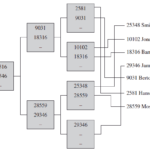Database systems generally use indices to provide fast access to relational data. An index is a separate physical data structure that enables queries to access one or more data rows fast. Proper tuning of indices is therefore a key for query … [Read more...] about Indices – Introduction to Indices
Indices
Clustered Indices, Nonclustered Indices
Clustered Indices A clustered index determines the physical order of the data in a table. The Database Engine allows the creation of a single clustered index per table, because the rows of the table cannot be physically ordered more than one way. … [Read more...] about Clustered Indices, Nonclustered Indices
Creating Indices (CREATE INDEX Statement)
The CREATE INDEX statement creates an index for the particular table. The general form of this statement is index_name identifies the name of the created index. An index can be established for one or more columns of a single table (table_name). … [Read more...] about Creating Indices (CREATE INDEX Statement)
Obtaining Index Fragmentation Information & Editing Index Information
During the life cycle of an index, it can become fragmented, meaning the storage of data in its pages is done inefficiently. There are two forms of index fragmentation: internal and external. Internal fragmentation specifies the amount of data, which … [Read more...] about Obtaining Index Fragmentation Information & Editing Index Information
Altering Indices & Removing and Renaming Indices
Altering Indices The Database Engine is one of a few database systems that support the ALTER INDEX statement. This statement can be used for index maintenance activities. The syntax of the ALTER INDEX statement is very similar to the syntax of the … [Read more...] about Altering Indices & Removing and Renaming Indices
Guidelines for Creating and Using Indices
Although the Database Engine does not have any practical limitations concerning the number of indices, it is advisable to limit them, for a couple of reasons. First, each index uses a certain amount of disk space, so it is possible that the total … [Read more...] about Guidelines for Creating and Using Indices
Special Types of Indices
The Database Engine allows you to create the following special types of indices: Indexed viewsFiltered indicesIndices on computed columnsPartitioned indicesColumn store indicesXML indicesFull-text indices Indexed views are based on views and … [Read more...] about Special Types of Indices


